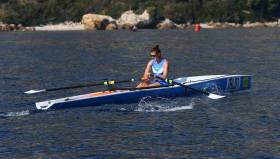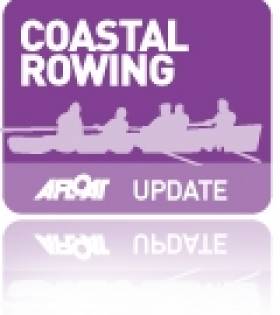Displaying items by tag: Cairndhu
Dukarska Wins Heat at World Coastal Rowing Championships
#Rowing: Monika Dukarska won her heat at the World Coastal Rowing Championships in Thonon in France this morning. She qualified for Saturday’s A Final of the Coastal Women’s Solo. Two other Ireland competitors, Jessica Lee of Killorglin and Jeanne O’Gorman of Arklow, will compete in the B Final after placing 13th and 16th respectively.
The women’s coxed quadruple from Castletownbere finished ninth in their heat and made the A Final, while Cairndhu and Courtmacsherry will compete in a B Final. They finished 12th and 13th in their heat.
The Galley Flash men’s double of David Duggan and Mark O’Brien finished 11th in their heat and go to the B Final.
Dukarska is the defending champion in the women’s solo.
World Coastal Rowing Championships, Thonon, France, Day One (Selected Results; Irish interest)
Men
Double – Heats (First Seven to A Final; 8 to 13 to B Final) Heat Two: 11 Galley Flash.
Single – Heats (First Seven to A Final; 8 to 13 to B Final): Heat One: 6 Castletownbere (A Sullivan-Greene), 7 Arklow (J Casey). Heat Two: 10 Galley Flash (B Hooper). Heat Three: 7 Bantry (A Hurley); 8 Arklow (A Goodison)
Women
Quadruple, Coxed – Heats (First 10 to A Final; rest to B Final) Heat One: 12 Cairndhu, 13 Courtmacsherry. Heat Two: 9 Castletownbere; 13 Galley Flash.
Double – Heats (First 10 to A Final; rest to B Final) Heat One : 14 Arklow
Solo – Heats (First 10 to A Final; rest to B Final) Heat One: 1 Killorglin (M Dukarska) 20 min 44.83 sec; 13 Killorglin (J Lee); 16 Arklow (J O’Gorman). Heat Two: 10 Arklow (S Healy); 16 Arklow (V Annesley).
Killorglin Rowing Club Excel at Irish Coastal Rowing Championships
#COASTAL ROWING: Killorglin won the final event of the day, the men’s four, at an Irish Coastal Rowing Championships which were blessed by good conditions at Lough Currane, Waterville, County Kerry. The blue riband event had gone to Cork clubs for the last four years, but Killorglin’s crew of Cathal Clifford, Cian Clifford, Seán Deignan and stroke Fionnán Crowley brought it back to the host county. Killorglin’s women’s four – stroked by Aileen Crowley – also won.
The award for Sporting Club of the Day went to Carnlough of Antrim, while Ring from Cork had taken the title of best overall junior club, and Cairndhu the best adult club.
Irish Coastal Rowing Championships, Waterville, Kerry (Selected Results, Finals Winners)
Men
Senior: Killorglin. Intermediate: Caherciveen. Junior: Ring. Under-21: Whitegate. Under-18: Passage West. Under-16: Killorglin.
Veterans: Portmagee. Pre-Vet: Fossa.
Women
Senior: Killorglin. Intermediate: Passage West. Junior: Galley Flash.
Under-21: Killorglin. Under-18: Sneem. Under-16: Kilmacsimon.
Veterans: Myross. Pre-Vet: Arklow.
Mixed
Senior: Killorglin. Veterans: Portmagee. Pre-Vet: Portmagee.






























































